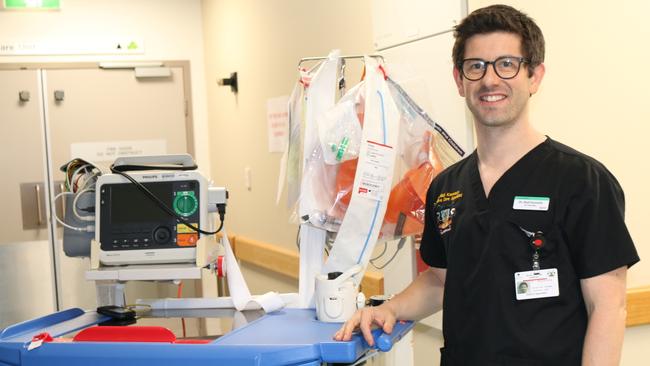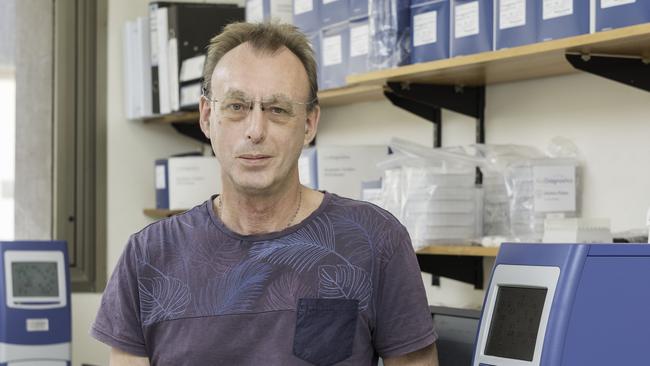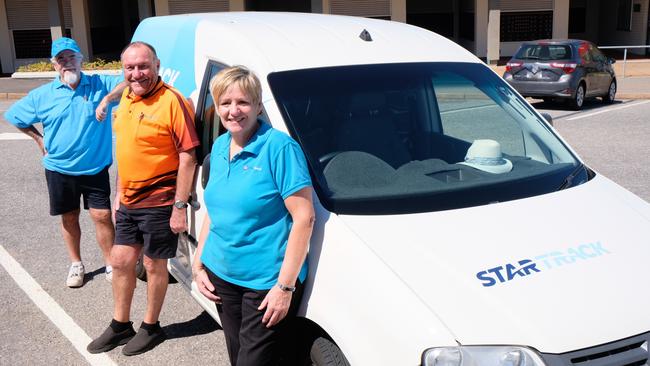OFTEN only two faces are thought about in organ donation: the donor and the recipient.
In this process, however, are a multitude of faces, from doctors and nurses to logistic staff and delivery drivers, who all ensure this precious gift of life is received.
Last year, the lives of 1683 Australians were saved by organ transplants.
In 2019, the Territory had a donation rate of 16.3 donors per million population.
MORE TOP NT NEWS
NT police officer resigns over border breach
CLP pledges better tender deal for local businesses to win contracts
Real estate boss slams government for pushing pet laws aside
Currently in the Territory, we are not able to perform organ transplants, but this does not stop the local Donate Life team from ensuring organ recipients have a second chance, and the families of the deceased have the chance to let their loved ones save the lives of others.
Intensive Care Unit specialist Niall Kennedy cares for and identifies patients who might be suitable for organ donation.
He says one of the most common misconceptions is that anyone can become an organ donor. In fact, a person has to pass specific circumstances in the ICU, either from when the heart stops beating or when the brain stops functioning.

Only 2 per cent of people who die in Australian hospitals can be considered for organ donation. Dr Kennedy believes it is for this reason Territorians need to start the conversation about organ donation with their families.
“If we could somehow find a way to maybe get away from the difficult concept of talking about death and dying and rather talk about — ‘if I were to die, I’d like to be an organ donor’ — then the rest of that conversation evolves over time,” he said.
“If people were just aware that if you unexpectedly died, and you were able to donate your organs to someone and save or change their lives, then it’s a good thing.
“I think if we could just get that out there, that it is a good thing to be an organ donor and a good consideration, then we can have more difficult conversations later down the track.”
Donation specialist nurse co-ordinator Shan Cairnes facilitates the donation process from consent with families to performing medical stability checks.
She said one of the most special parts about her job was seeing the generosity of people while grieving, and that the act often provided families with a sense of comfort.
“We’re meeting families in their worst possible times, and asking them something that most people have not even thought about,” she said.
“We’re trying to support them through fairly acute grief and, at the same time, seeing if this is something that they would be interested in. And I guess seeing that amazing ability of people to think of other people, even when they’re in these horrible, horrible moments, that they can still think of other people and consider organ donation.”
When a patient is dying and their family has agreed to organ donation, a critical part of the process is physiotherapy by an ICU specialist, who treats a patient’s lungs to reduce the chance of chest infections and improve circulation.
Once a person has been identified for potential organ donation, their blood and tissue is tested to see if the organs can be used.
Network supervising scientist Kevin Freeman tests the organs for their viability. He tests whether organs have conditions such as hepatitis C or syphilis, so the organs can be donated to the right people, and throughout his career has seen many innovations.
He said one of the most incredible was watching technology evolve to the point where testing that once took six hours now takes 45 minutes.
Mr Freeman said that at first being part of the process to save a life was daunting, but now it was a privilege to help others.
“You start to feel like OK, look, it is very important what you’re doing,” he said.

“Even though the family may feel very distressed and everything like that when a family member passes, I think, with many people, it can give them some sort of comfort.”
The last leg of an organ’s journey in the Territory is in the hands of Darwin’s StarTrack team.
Next flight co-ordinator and supervisor Diane Flowers is responsible for finding the best dates and times for an organ to be transported interstate.
She springs into action once she is alerted about a possible donation.
Ms Flowers also facilitates bloods and tissue to go out for matching.
Once a match is found, she collects the best dates and times for delivery, and then arranges transport when flights are selected.
For Ms Flowers, who has facilitated organ transport for about 10 years, it is not just a job — it becomes personal.
“You have such a strong ownership of it, you really do want this to work,” she said.
“We all go on high alert and make sure that anything and everything that could go wrong doesn’t. We had a recent case where the plane got delayed because the ramp was broken and it couldn’t get any luggage on the plane. We had ours sitting in the front row of business class.

‘That was with the assistance of a guy from Qantas who went and physically got them and put them up on the plane. Everyone involved in the process takes absolute care because we want it to work well.
LIMITED TIME – Discounted NT News subscription: Read everything for $1
“You want it, you know you can’t relax until you know that they’re where they should be.”
The cycle of organ donation is complete once it arrives at its destination, and is transplanted into the recipient, who goes on to hopefully live a long life.
Register at donate-life.gov .au

Add your comment to this story
To join the conversation, please log in. Don't have an account? Register
Join the conversation, you are commenting as Logout
‘Treated like animals’: Death in custody warning over watch house
Women are allegedly being crowded into cells in view of masturbating men at the Territory’s police watch house. WARNING: Distressing images.
Mental health advocate uses personal pain as strength
The award-winning mental health facilitator and advocate is passionate about breaking cycles of violence and is not afraid to use her own painful story to do it.